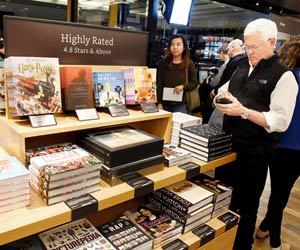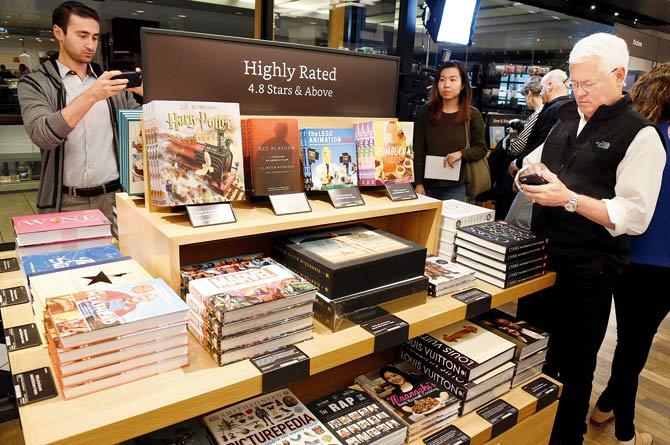Unlike a 'real' store, the Internet gives us the illusion of easily accessible choice, while subtly inhibiting it at the same time

 I just loved the Amazon bookshop. By which I don't mean the online bookshop, which is how Amazon really started out - steadily expanding its e-commerce business to the point that nearly half of all sales on the Internet (of everything one buys) in the US, occur through the same site. And this is growing at a rate that makes the paranoid (like me) believe, sooner or later, they will colonise most urban consumption!
I just loved the Amazon bookshop. By which I don't mean the online bookshop, which is how Amazon really started out - steadily expanding its e-commerce business to the point that nearly half of all sales on the Internet (of everything one buys) in the US, occur through the same site. And this is growing at a rate that makes the paranoid (like me) believe, sooner or later, they will colonise most urban consumption!
ADVERTISEMENT

Customers browse the collection at Amazon Books' first brick-and-mortar store at Manhattan's Time Warner Center on May 25. Pic/AFP
Maybe that's the future. Or the present. Sometime in 2015, Amazon, the inventor of the e-book Kindle, decided to turn the clock backwards, and build their first proper brick-and-mortar, offline kitaab shop in Seattle, giving oldies hope for the fact that the idea of the 'real' bookstore we grew up on wasn't dead after all, although it's been dying for a while. Basically, the problem itself had displayed a solution. In India, of course, a Crosswords sells everything - toys, stationery, DVDs - but books. This isn't surprising. We're hardly a reading culture.
Amazon exponentially spread their offline biz to a chain of over a dozen-plus bookstores, with an early one coming up in Manhattan this year, that I finally, excitedly checked out. Why did I love it so much? For exactly the opposite reason I hate the Strand in New York - a dull monstrosity with six floors of second-hand books, stacked up in shelves, over shelves, ceiling to ceiling, with hardcovers and paperbacks flowing over to the pavement outside, selling at a buck or few - only a mile away from Amazon.
You can easily spend the whole day in Strand, discovering titles that you never knew existed - picking up stuff that you will neither have space to carry (or keep), nor perhaps the time to read. Actually, you know what, you will eventually find the time to read, so long as that book stays on your shelf like a confident underdog, hardly ever screaming for attention. Until then, it will gather dust. I steer clear of Strand just as an addict is advised caution against intoxicants they simply love too much.
The Amazon bookstore I walked into, in contrast, seemed like a website that allows you to literally walk through. The design is deliberate. As is the content curation, driven by consumer data alone. Books face you front-cover, rather than being placed along the spine. Each book comes with a customer review, with mainly the most popular ones making it to the shelf. An intuitive arrow guides you to titles you might like, if the one before your eyes has caught your fancy. What is wrong with a navigational bookstore of this sort? Just as what's wrong with the Internet often: It gives you the illusion of choice, while subtly inhibiting it at the same time. There is little scope for serendipity.
This is quite similar to accessing information/opinions/local and global events on Twitter or social media, following hashtags and popular trends, as against a newspaper, where your eyes independently glance through pages after pages of ads and news of the day, always accidentally chancing upon an infant's pocket-sized item on the sixth or eighth page that inevitably interests you more than anything else.
I know this from an October 10 issue of a national daily that's been rotting in my bathroom ever since. Simply skimming through its pages this morning, I could quiz you about really fascinating stuff that you'd have no idea about (at least I didn't), because you've been too busy trolling Trump. A lot of trivia junkies, story-tellers, grew up collecting such exquisite pieces of treasure/trash tucked away in corners of dailies and magazines. We're told kids don't read them anymore. I can tell you what they're missing out on - personal discoveries.
Is this any different from adjusting your musical or movie tastes to chartbusters alone? Of course there are online cool-hunters and critics pointing you to something satisfyingly special still. Or perhaps not, when even reviews often get reduced to a crowd-sourced barometer - the Tomatometer, for instance - that makes critical acclaim also a function of collective approval. And reccos, more often than not, show up from among friends on Insta/Facebook, who are a lot like you anyway.
Was my trip to Amazon's 'real' bookstore a complete waste then, or suitably profitable, since I didn't go around grazing like a goat? Well, I'd taken my little nephew and niece over. They knew the section to head towards (mostly 'children's', which is easier explained than 'page-turners'). I think they got what they wanted. I refarined from lecturing them on what they might be missing out on, and how things used to be, back in the day! Still, stepping out of the store, with the above-mentioned thoughts playing in my head, I also sensed that the process of my 'uncle-isation' is formally complete. Yeah well. So what. I am an uncle. Deal with it!
Mayank Shekhar attempts to make sense of mass culture. He tweets @mayankw14. Send your feedback to mailbag@mid-day.com
 Subscribe today by clicking the link and stay updated with the latest news!" Click here!
Subscribe today by clicking the link and stay updated with the latest news!" Click here!






